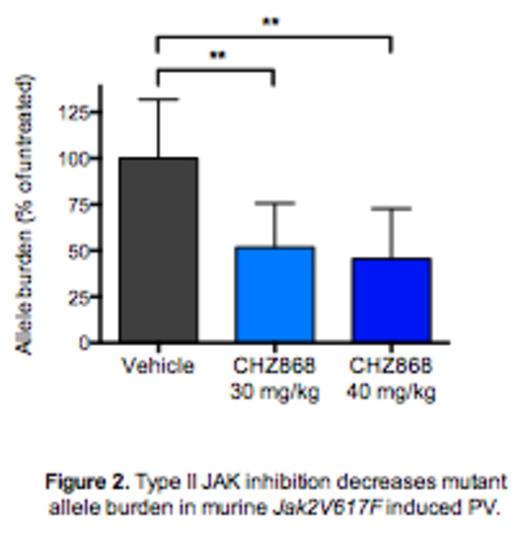Abstract
The identification of JAK2 mutations in patients with myeloproliferative neoplasms (MPN) led to the clinical development of JAK2 inhibitors, and the JAK1/2 inhibitor ruxolitinib has been approved for the treatment of myelofibrosis (MF). Although clinically tested JAK inhibitors improve MPN-associated splenomegaly and systemic symptoms, they do not significantly reduce the MPN clone in most MPN patients.We previously demonstrated that MPN cells can acquire persistence to ruxolitinib and other type I JAK inhibitors which bind the active conformation of JAK2, and that JAK2 inhibitor persistence is associated with reactivation of JAK-STAT signaling and with heterodimerization between activated JAK2 and JAK1/TYK2, consistent with activation of JAK2 in trans by other JAK kinases. We have now extended our studies to other type I JAK inhibitors in clinical development, including CYT387, BMS911543 and SAR302503. In each case we see the same mechanism of persistence as observed with ruxolitinib, with transactivation of JAK2 by other JAK kinases. Most importantly, we found that MPN cells which were persistent to one JAK inhibitor were insensitive to the other JAK inhibitors, suggesting that the mechanisms which limit overall efficacy of ruxolitinib will limit the efficacy of other JAK inhibitors in clinical development.
All JAK inhibitors in clinical development are type I inhibitors that interact with and inhibit the active confirmation of the JAK2 kinase. We hypothesized that novel, type II JAK inhibitors that interact with and inhibit JAK2 in the inactive conformation might retain activity in JAK inhibitor persistent cells and show increased efficacy in murine MPN models. We therefore characterized the efficacy of NVP-CHZ868, a novel type II JAK inhibitor, in MPN cells and in murine MPN models. CHZ868 potently inhibited proliferation of cells expressing the JAK2V617F mutation or the TEL-JAK2 fusion. We found that JAK2/MPL-mutant cell lines were universally sensitive to NVP-CHZ868. CHZ868 treatment of JAK2-mutant SET2 cells induced a higher degree of apoptosis compared to ruxolitinib. Signaling studies demonstrated that CHZ868 more potently attenuated JAK-STAT signaling in JAK2/MPL-mutant cells, with suppression of JAK2 phosphorylation consistent with a type II mechanism of kinase inhibition.
We next investigated the ability of CHZ868 to inhibit the proliferation and signaling of MPN cells that had acquired persistence to type I JAK inhibitors. Type II inhibition with CHZ868 completely suppressed JAK-STAT signaling in type I JAK inhibitor-persistent cells, and prevented heterodimeric activation of JAK2 by JAK1 and TYK2. Most importantly, JAK2/MPL-mutant cells which were insensitive to type I JAK inhibitors remained highly sensitive to CHZ868, demonstrating that type I JAK inhibitor persistence does not confer resistance to type II inhibitors.
We next evaluated the efficacy of CHZ868 in murine models of JAK2/MPL-mutant MPN. CHZ868 showed significant activity in conditional knock-in and bone marrow transplant (BMT) models of Jak2V617F-induced polycythemia vera, with normalization of hematocrit, reversal of stem/progenitor expansion, normalization of splenomegaly/splenic architecture, and reversal of bone marrow fibrosis. CHZ868 demonstrated similar activity in the MPLW515L BMT model of MF, with normalization of blood counts, stem/progenitor expansion, spleen weights, and extramedullary hematopoiesis in vivo. Most importantly, CHZ868 resulted in significant reductions of mutant allele burden (mean allele burden reduction 49%) in the Jak2V617F model. We observed analogous reductions in allele burden in the Jak2V617F and MPLW515L BMT models, consistent with disease modifying activity.
Taken together, our data demonstrate that a spectrum of type I JAK inhibitors induce JAK inhibitor persistence, by a similar mechanism of JAK2 transactivation as observed with ruxolitinib. By contrast, type II JAK inhibition with CHZ868 remains highly active in JAK inhibitor persistent cells, and shows increased activity in murine MPN models. These data demonstrate that novel JAK inhibitors can increase target inhibition and therapeutic efficacy and should be pursued as an approach to improve outcomes for MPN patients.
Koppikar:Amgen: Employment. Sellers:Novartis: Employment. Hofmann:Novartis: Employment. Baffert:Novartis: Employment. Gaul:Novartis: Employment. Radimerski:Novartis: Employment. Levine:Novartis: Consultancy, Grant support Other.
Author notes
Asterisk with author names denotes non-ASH members.



This feature is available to Subscribers Only
Sign In or Create an Account Close Modal